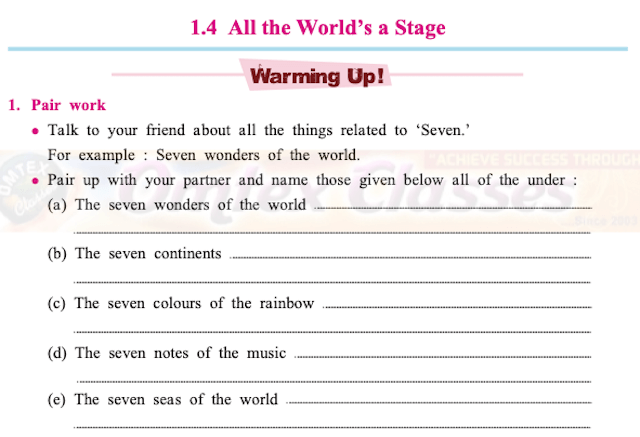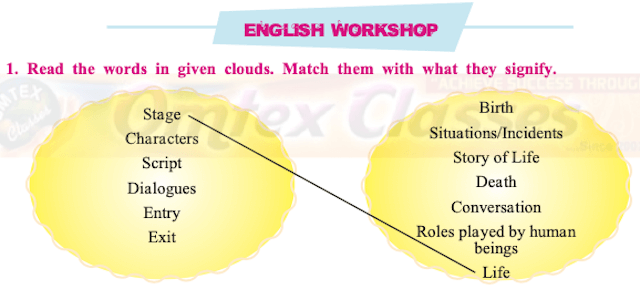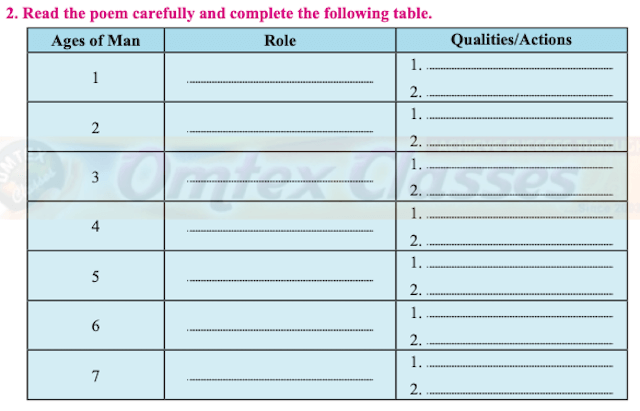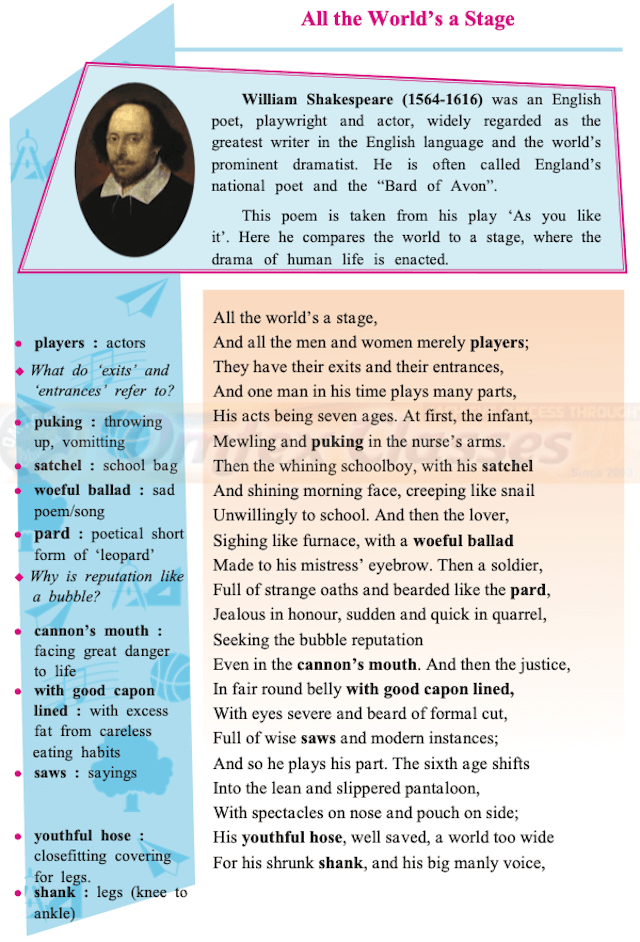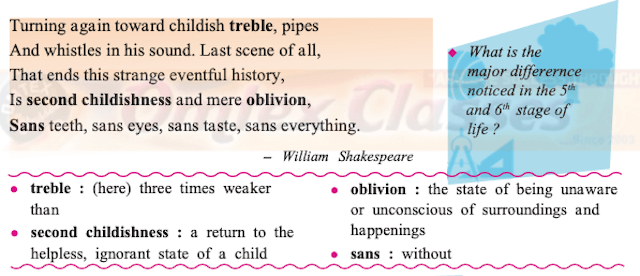Maharashtra State Board Class 10 English Kumar Bharati Textbook Solutions Unit Chapter 1.4 All the World’s a Stage.
Maharashtra Board Class 10 English Solutions Unit 1.4 Warming Up Questions and Answers.
WARMING UP! Q 1 PAGE 23
SOLUTION
- The Seven wonders of the world- The Great Wall of China, Christ the Redeemer Statue, Machu Picchu, Chichen Itza, The Roman Colosseum, The Taj Mahal and Petra Asia, Europe.
- The Seven continents- Australia, Africa, North America, South America,
Antarctica. The Seven colours of the rainbow- violet, indigo, blue, green, yellow, orange, red.
- The Seven notes of the musical scale- sa re-ga-ma-pa-da-ni.
- The Seven seas of the world- Arctic Ocean, Antarctic Ocean, North Atlantic Ocean, South Atlantic Ocean, Indian Ocean, North Pacific Ocean, South Pacific Ocean.
- The Seven wonders of the world- The Great Wall of China, Christ the Redeemer Statue, Machu Picchu, Chichen Itza, The Roman Colosseum, The Taj Mahal and Petra Asia, Europe.
- The Seven continents- Australia, Africa, North America, South America,
Antarctica. The Seven colours of the rainbow- violet, indigo, blue, green, yellow, orange, red.
- The Seven notes of the musical scale- sa re-ga-ma-pa-da-ni.
- The Seven seas of the world- Arctic Ocean, Antarctic Ocean, North Atlantic Ocean, South Atlantic Ocean, Indian Ocean, North Pacific Ocean, South Pacific Ocean.
WARMING UP! Q 2 PAGE 23
Life is often compared to many things. Write down 7 things that life can be compared to and justify the comparison. For example,
- Life is a keyboard; if you press the right keys. you have typed a good destiny.
- _____________________
- _____________________
- _____________________
- _____________________
- _____________________
- _____________________
Life is often compared to many things. Write down 7 things that life can be compared to and justify the comparison. For example,
- Life is a keyboard; if you press the right keys. you have typed a good destiny.
- _____________________
- _____________________
- _____________________
- _____________________
- _____________________
- _____________________
SOLUTION
- Life is a keyboard; if you press the right keys. you have typed a good destiny.
Life is a river-always flowing.
Life is like a seed: It will never grow unless planted, nourished and nurtured.
Life is like an elevator, with lots of ups and downs.
Life is like an onion. You peel off layer after layer. Sometimes it makes you weep.
Life is like a jigsaw puzzle. You have all the pieces, but you have to put them together correctly.
Life is like a jack-in-the-box. You never know when you are going to get a box on your chin.
- Life is a keyboard; if you press the right keys. you have typed a good destiny.
Life is a river-always flowing.
Life is like a seed: It will never grow unless planted, nourished and nurtured.
Life is like an elevator, with lots of ups and downs.
Life is like an onion. You peel off layer after layer. Sometimes it makes you weep.
Life is like a jigsaw puzzle. You have all the pieces, but you have to put them together correctly.
Life is like a jack-in-the-box. You never know when you are going to get a box on your chin.
WARMING UP! Q 3 PAGE 23
Match the approximate ages with the stages.
No Age-group Stages 1 Birth to 2 years a teenage/adolescence 2 3 years to 12 years b old age/second childhood 3 13 years to 17 years c middle - age 4 18 years to about 44 years
d babyhood/infancy 5 About 45 years to 60 years
e senior citizen/elderly person 6 65 years up to 75 to 80 years
f adulthood 7 Above 80 years
g childhood
Match the approximate ages with the stages.
| No | Age-group | Stages | |
| 1 | Birth to 2 years | a | teenage/adolescence |
| 2 | 3 years to 12 years | b | old age/second childhood |
| 3 | 13 years to 17 years | c | middle - age |
| 4 | 18 years to about 44 years | d | babyhood/infancy |
| 5 | About 45 years to 60 years | e | senior citizen/elderly person |
| 6 | 65 years up to 75 to 80 years | f | adulthood |
| 7 | Above 80 years | g | childhood |
SOLUTION
No Age-group Stages 1 Birth to 2 years d babyhood/infancy 2 3 years to 12 years g childhood 3 13 years to 17 years a teenage/adolescence 4 18 years to about 44 years
f adulthood 5 About 45 years to 60 years
c middle-age
6 65 years up to 75 to 80 years
e senior citizen/ elderly person 7 Above 80 years
b old age/second childhood
| No | Age-group | Stages | |
| 1 | Birth to 2 years | d | babyhood/infancy |
| 2 | 3 years to 12 years | g | childhood |
| 3 | 13 years to 17 years | a | teenage/adolescence |
| 4 | 18 years to about 44 years | f | adulthood |
| 5 | About 45 years to 60 years | c | middle-age |
| 6 | 65 years up to 75 to 80 years | e | senior citizen/ elderly person |
| 7 | Above 80 years | b | old age/second childhood |
ENGLISH WORKSHOPPAGES 25 - 27
ENGLISH WORKSHOPQ 1 PAGE 25
Read the words in given clouds. Match them with what they signify.
Column A Column B (a) Stage 1. Birth (b) Characters 2. Situations/Incidents (c) Script 3. Story of Life (d) Dialogues 4. Death (e) Entry 5. Conversation (f) Exit 6. Roles played by human beings 7. Life
Read the words in given clouds. Match them with what they signify.
| Column A | Column B |
| (a) Stage | 1. Birth |
| (b) Characters | 2. Situations/Incidents |
| (c) Script | 3. Story of Life |
| (d) Dialogues | 4. Death |
| (e) Entry | 5. Conversation |
| (f) Exit | 6. Roles played by human beings |
| 7. Life |
SOLUTION
Column A Column B (a) Stage 7. Life (b) Characters 6. Roles played by human beings (c) Script 3. Story of Life (d) Dialogues 5. Conversation (e) Entry 1. Birth (f) Exit 4. Death
| Column A | Column B |
| (a) Stage | 7. Life |
| (b) Characters | 6. Roles played by human beings |
| (c) Script | 3. Story of Life |
| (d) Dialogues | 5. Conversation |
| (e) Entry | 1. Birth |
| (f) Exit | 4. Death |
ENGLISH WORKSHOPQ 2 PAGE 25
SOLUTION
Ages of man Role Qualities/Actions 1 infant 1. frightened 2. crying, puking 2 schoolboy 1. unhappy 2. whining, creeping unwillingly to school 3 lover 1. woeful 2. sighing, singing sad ballads 4 soldier 1. jealous in honour, ambitious 2. quarreling, facing danger 5 adult man 1. fat, serious and wise 2. giving advice 6 middle-aged man 1. thin and shrunken 2. talking in a shrill-voice 7 very old man 1. senile, child-like 2. oblivious to his surroundings
| Ages of man | Role | Qualities/Actions |
| 1 | infant | 1. frightened |
| 2. crying, puking | ||
| 2 | schoolboy | 1. unhappy |
| 2. whining, creeping unwillingly to school | ||
| 3 | lover | 1. woeful |
| 2. sighing, singing sad ballads | ||
| 4 | soldier | 1. jealous in honour, ambitious |
| 2. quarreling, facing danger | ||
| 5 | adult man | 1. fat, serious and wise |
| 2. giving advice | ||
| 6 | middle-aged man | 1. thin and shrunken |
| 2. talking in a shrill-voice | ||
| 7 | very old man | 1. senile, child-like |
| 2. oblivious to his surroundings |
ENGLISH WORKSHOPQ 3 PAGE 26
SOLUTION
- 2nd stage and the 4th-
The second stage is that of a school boy, complaining and crying. He goes to school early in the morning, with a well-scrubbed, shining face. He carries his school bag and creeps slowly, like a snail, unwilling to go to school.
The fourth stage is that of an aggressive soldier, bearded like a leopard and full of oaths. He is jealous where his honour is concerned and is quick to quarrel. He is ambitious, and does useless things for his reputation, even endangering his life for it. - 3rd stage and 5th stage:
The third stage is that of a lover, who is breathless and sighing with passion. He sings sad songs to the beauty of his lover.
The fifth stage is that of a mature middle-aged man with a round belly. He is stern and formal and full of wisdom. He is keen on justice, is fat, and has opinions on bribery, a system which was prevalent at that time. He is full of wise sayings and gives modern examples.
1st stage and 7th (last) stage:
The first stage is that of an infant, crying weakly and throwing up in his nurse's arms. He is unaware of what is happening around him. The baby, at this stage, is without teeth, without vision, without taste and without anything.
The last stage of all, which ends this eventful life, is when man becomes senile and enters his second childhood. He is again unaware of what is happening around him. This final stage is when he is once more without teeth, without vision, without taste and without anything.
- 2nd stage and the 4th-
The second stage is that of a school boy, complaining and crying. He goes to school early in the morning, with a well-scrubbed, shining face. He carries his school bag and creeps slowly, like a snail, unwilling to go to school.
The fourth stage is that of an aggressive soldier, bearded like a leopard and full of oaths. He is jealous where his honour is concerned and is quick to quarrel. He is ambitious, and does useless things for his reputation, even endangering his life for it. - 3rd stage and 5th stage:
The third stage is that of a lover, who is breathless and sighing with passion. He sings sad songs to the beauty of his lover.
The fifth stage is that of a mature middle-aged man with a round belly. He is stern and formal and full of wisdom. He is keen on justice, is fat, and has opinions on bribery, a system which was prevalent at that time. He is full of wise sayings and gives modern examples. 1st stage and 7th (last) stage:
The first stage is that of an infant, crying weakly and throwing up in his nurse's arms. He is unaware of what is happening around him. The baby, at this stage, is without teeth, without vision, without taste and without anything.
The last stage of all, which ends this eventful life, is when man becomes senile and enters his second childhood. He is again unaware of what is happening around him. This final stage is when he is once more without teeth, without vision, without taste and without anything.
ENGLISH WORKSHOPQ 4 PAGE 26
Pick out lines that contain Imagery (a picture created in the mind by using words) of the following people.
- School boy - _____________
(2nd stage) - _____________ - Soldier - ___________
(4th stage) - _________ - Judge - ___________
(5th stage) - ___________ - Senior citizen - ___________
(6th stage) - ____________
Pick out lines that contain Imagery (a picture created in the mind by using words) of the following people.
- School boy - _____________
(2nd stage) - _____________ - Soldier - ___________
(4th stage) - _________ - Judge - ___________
(5th stage) - ___________ - Senior citizen - ___________
(6th stage) - ____________
SOLUTION
- School boy (2nd stage)-
1. The whining schoolboy, with his satchel and shining morning face
2. creeping like a snail unwillingly to school. - Soldier (4th stage)-
1. Full of strange oaths and bearded like the pard
2. Jealous in honour, sudden and quick in quarrel. - Judge (5th stage)-
1. In fair round belly with good capon lined
2. With eyes severe and beard of formal cut - Senior citizen (6th stage)-
1. His youthful hose, well-saved, a world too wide
2. For his shrunk shank6. Think and write on your own.
- School boy (2nd stage)-
1. The whining schoolboy, with his satchel and shining morning face
2. creeping like a snail unwillingly to school. - Soldier (4th stage)-
1. Full of strange oaths and bearded like the pard
2. Jealous in honour, sudden and quick in quarrel. - Judge (5th stage)-
1. In fair round belly with good capon lined
2. With eyes severe and beard of formal cut - Senior citizen (6th stage)-
1. His youthful hose, well-saved, a world too wide
2. For his shrunk shank6. Think and write on your own.
ENGLISH WORKSHOPQ 5 PAGE 26
You will notice that there is no Rhyme-scheme in the poem. It appears similar to the poem 1.1 ‘Where the Mind is Without Fear’ by Tagore.
However, Tagore’s poem has no steady rhythm/meter either it is called Free Verse. Shakespeare uses lines with a steady rhythm of 5 beats in each. It is termed as Blank Verse. (No rhyme-scheme but uniformity in rhythm) Copy the lines from “Ánd all the men and women merely players” to “sudden and quick in quarrel”. Put a stress mark on each of the syllables stressed in the lines as - for example, And all the men and women merely players;
You will notice that there is no Rhyme-scheme in the poem. It appears similar to the poem 1.1 ‘Where the Mind is Without Fear’ by Tagore.
However, Tagore’s poem has no steady rhythm/meter either it is called Free Verse. Shakespeare uses lines with a steady rhythm of 5 beats in each. It is termed as Blank Verse. (No rhyme-scheme but uniformity in rhythm) Copy the lines from “Ánd all the men and women merely players” to “sudden and quick in quarrel”. Put a stress mark on each of the syllables stressed in the lines as - for example, And all the men and women merely players;
SOLUTION
Do it yourself.
ENGLISH WORKSHOPQ 6 PAGE 26
SOLUTION
The theme of this poem is the cycle of life. It tells us how one starts out an infant, helpless and without understanding, and ends the same way. without being aware of what is happening around one.
Think and write on your own.
Which two stages of man, described by Shakespeare, sound humorous? Say why.
Think and write on your own.
Which two stages of man, described by Shakespeare, sound humorous? Say why.
SOLUTION
The second and third stages are humorous. One can just imagine the school boy, complaining and whining, creeping to school slowly with a well-scrubbed and shining face. The third stage, where the lover sighs loudly and sings sad poems and songs. is also humorous.
Think and write on your own.
The last (7th) stage of life sounds very sad and miserable. How can you make old age also cheerful and happy?
Think and write on your own.
The last (7th) stage of life sounds very sad and miserable. How can you make old age also cheerful and happy?
SOLUTION
The first stage is that of an infant, crying weakly and throwing up in his nurse's arms. He is unaware of what is happening around him. The baby, at this stage, is without teeth, without vision, without taste and without anything.
The last stage of all, which ends this eventful life, is when man becomes senile and enters his second childhood. He is again unaware of what is happening around him. This final stage is when he is once more without teeth, without vision, without taste and without anything.
The last stage of all, which ends this eventful life, is when man becomes senile and enters his second childhood. He is again unaware of what is happening around him. This final stage is when he is once more without teeth, without vision, without taste and without anything.
ENGLISH WORKSHOPQ 7 A PAGE 27
SOLUTION
- world - stage
- actors - players
- birth and death - entrances and exits
- school boy - a snail
- the lover's sigh - a furnace
- spotted leopard - bearded soldier
- last stage (old age) - The second childishness
- world - stage
- actors - players
- birth and death - entrances and exits
- school boy - a snail
- the lover's sigh - a furnace
- spotted leopard - bearded soldier
- last stage (old age) - The second childishness
ENGLISH WORKSHOPQ 7 B PAGE 27
SOLUTION
And shining morning face, creeping like snail.
Sighing like furnace, with a woeful balled.
Pick out from the poem two examples of each.
Onomatopoeia
And shining morning face, creeping like snail.
Sighing like furnace, with a woeful balled.
Pick out from the poem two examples of each.
Onomatopoeia
SOLUTION
Mewling and puking in the nurse's arms.
And whistles in his sound. Last scene of all,
Pick out from the poem two examples of each.
Alliteration
Mewling and puking in the nurse's arms.
And whistles in his sound. Last scene of all,
Pick out from the poem two examples of each.
Alliteration
SOLUTION
They have their exits and their entrances
For his shrunk shank, and his big manly voice,
Pick out from the poem two examples of each.
Metaphor
They have their exits and their entrances
For his shrunk shank, and his big manly voice,
Pick out from the poem two examples of each.
Metaphor
SOLUTION
- All the world's a stage
- And all the men and women merely players
Pick out from the poem two examples of each.
Inversion
- All the world's a stage
- And all the men and women merely players
Pick out from the poem two examples of each.
Inversion
SOLUTION
- Made to his mistress’ eyebrow. Then a soldier
- With eyes severe and beard of formal cut,
Pick out from the poem two examples of each.
Transferred Epithet
- Made to his mistress’ eyebrow. Then a soldier
- With eyes severe and beard of formal cut,
Pick out from the poem two examples of each.
Transferred Epithet
SOLUTION
- Into the lean and slippered pantaloon,
- His youthful hose, well saved, a world too wide
- Into the lean and slippered pantaloon,
- His youthful hose, well saved, a world too wide
ENGLISH WORKSHOPQ 8 PAGE 27
Read the summary of the play ‘As You Like It’ by William Shakespeare using the Internet. Find out which character has narrated the above poem and on what occasion. Also, make a list of all the characters of the play.
SOLUTION
The character who has narrated the above poem in the play 'As You Like It' by William Shakespeare is Jacques. He narrates it in Act II, Scene VII in reply to an idea given by Orlando.
Some of the other characters in the play are: Celia, Rosalind, Orlando, Oliver. Duke Senior, Duke Frederick, Touchstone, etc.
Some of the other characters in the play are: Celia, Rosalind, Orlando, Oliver. Duke Senior, Duke Frederick, Touchstone, etc.
ENGLISH WORKSHOPQ 9 PAGE 27
Read the poem again and write an appreciation of the poem in paragraph format.
SOLUTION
The poem 'All the World's a Stage by William Shakespeare is taken from Shakespeare's play 'As you like it. It is a monologue (a loud speech to oneself) by one of the characters in the play. In this poem Shakespeare compares life to a stage. He has divided life into seven stages, each having its own varied qualities and features. The theme of the poem is the cycle of life. It tells us how one starts out an infant helpless, without understanding, and ends the same way, without being aware of what is happening around one.
The poem is written in blank verse 1e. there is no rhyme scheme, but there is a steady rhythm of flve beats in each line. There are many figures of speech. like Simile, Alliteration and Repetition, but the one that stands out is Metaphor. In the lines 'All the world's a stage. And all men and women are merely players', there is an implied comparison between two different things.
The special feature of the poem is the imagery
Many of the lines create a picture before our eyes and help us to imagine the seven stages in man's life. The narrative style used by the poet gives continuity to the poem, where one stage smoothly goes into the next This is one of the most famous and quoted poems of Shakespeare. It is entirely metaphorical. My favourite line is 'All the world's a stage, And all men and women are merely players. I like this line because describes correctly how we must look at life. Like the poem because it shows us the cycle of life, of which everyone is a part.
The poem 'All the World's a Stage by William Shakespeare is taken from Shakespeare's play 'As you like it. It is a monologue (a loud speech to oneself) by one of the characters in the play. In this poem Shakespeare compares life to a stage. He has divided life into seven stages, each having its own varied qualities and features. The theme of the poem is the cycle of life. It tells us how one starts out an infant helpless, without understanding, and ends the same way, without being aware of what is happening around one.
The poem is written in blank verse 1e. there is no rhyme scheme, but there is a steady rhythm of flve beats in each line. There are many figures of speech. like Simile, Alliteration and Repetition, but the one that stands out is Metaphor. In the lines 'All the world's a stage. And all men and women are merely players', there is an implied comparison between two different things.
The special feature of the poem is the imagery
Many of the lines create a picture before our eyes and help us to imagine the seven stages in man's life. The narrative style used by the poet gives continuity to the poem, where one stage smoothly goes into the next This is one of the most famous and quoted poems of Shakespeare. It is entirely metaphorical. My favourite line is 'All the world's a stage, And all men and women are merely players. I like this line because describes correctly how we must look at life. Like the poem because it shows us the cycle of life, of which everyone is a part.
